|
|
|
Sort Order |
|
|
|
Items / Page
|
|
|
|
|
|
|
| Srl | Item |
| 1 |
ID:
172353
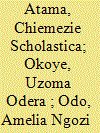

|
|
|
|
|
| Summary/Abstract |
Despite the benefit of modern contraception, its use remains low in Nigeria. This study examined belief system as a barrier to the use of modern contraceptives among the Idoma of Benue State, North Central Nigeria. Questionnaire (n = 1107), in-depth interview (n = 6) and focus group discussion (n = 52) were used to collect data from three local government areas (LGAs). The results showed high levels of knowledge (88.0%), however, only 37.8% used modern contraceptives. The male condom had the highest percentage use (56.7%). Chi-square results showed that LGA, education and occupation were significantly related to the use of modern contraceptives. Being of greater age increased the likelihood of use, whereas higher levels of education and income decreased the likelihood of modern contraceptive use (p < 0.05). Qualitative data indicated that married women were expected to eschew modern contraceptives due to their belief in Alekwu, the community deity. Designing interventions that are culturally specific could promote use of modern contraceptives among the group.
|
|
|
|
|
|
|
|
|
|
|
|
|
|
|
|
| 2 |
ID:
172348
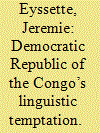

|
|
|
|
|
| Summary/Abstract |
The aim of this article is to assess whether the Democratic Republic of the Congo (DR Congo) is likely to upgrade the status of English by constitutional or educational means. Indeed, neighboring countries such as Rwanda and Burundi adopted English as their official language in 1996 and 2014, but less writing in English is devoted to a potential linguistic transition in DR Congo, the most populous French-speaking country. This article will gauge DR Congo and Rwanda against the four criteria that arguably triggered Rwanda’s switch-to-English: historical factors in current linguistic trends; the role of charismatic leaders in sudden language policy changes; language-in-education policies; and economic incentives. The results of this interdisciplinary investigation into the language dynamics of the Great Lakes region indicate that, reflecting the vehicles of DR Congo’s domestic and regional evolutions, its leaders might be tempted to enhance the status of English as an official language in a way that, contrary to Rwanda’s radical switch-to-English, is more compatible with other languages.
|
|
|
|
|
|
|
|
|
|
|
|
|
|
|
|
| 3 |
ID:
172349


|
|
|
|
|
| Summary/Abstract |
The resurgence of the debate on standardization of labor laws via trade has brought into focus the importance of labeling programs, which are seen as a desirable avenue to remedy weak labor laws in the “South.” This study aims to quantify the impact of the Fairtrade labeling program on the welfare position of workers in the football industry. Propensity Score Matching (PSM) is used to calculate the treatment effect of the program. The study finds no treatment effect of labeling upon the welfare condition of workers. It concludes that the overall program has failed to make an impact upon the lives of workers.
|
|
|
|
|
|
|
|
|
|
|
|
|
|
|
|
| 4 |
ID:
172352


|
|
|
|
|
| Summary/Abstract |
In this article, the Nigerian Ex-Servicemen’s Welfare Association is critically examined as an institutional mechanism Britain deployed to gauge and regulate the reintegration of Nigerian ex-servicemen into civilian life. It draws on Nigerian archival sources to establish that the demobilisation instrument, wartime recruitment promises and the skills ex-servicemen acquired during their military service had raised their hopes of gainful, post-war resettlement. However, the Nigerian Ex-Servicemen’s Welfare Association, formed in 1946 by the government and led by British military personnel, became a buffer between ex-servicemen and the government and part of the regulatory officialdom that hampered the processing of the veterans’ petitions.
|
|
|
|
|
|
|
|
|
|
|
|
|
|
|
|
| 5 |
ID:
172346
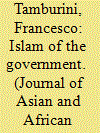

|
|
|
|
|
| Summary/Abstract |
Islam, in its relation between state and politics, has often been used to strengthen the sense of national identity or as a tool of self-legitimation by Arab regimes to gain the support of the people. This happened in Algeria, Morocco, Mauritania and Tunisia, where the state not only co-opted religion for official purposes but absorbed the ‘ulamā’, the religious establishment, in the administration as simple employees of newly created institutions, such as the High Islamic Councils. This article aims to shed light on these little-known organizations, one of the regime’s keystones to having a firm hold on their power.
|
|
|
|
|
|
|
|
|
|
|
|
|
|
|
|
| 6 |
ID:
172345
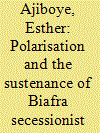

|
|
|
|
|
| Summary/Abstract |
This study examines polarisation in citizens’ online discourses about Biafra agitations in Nigeria. Using critical discourse analysis and the appraisal framework, it analyses 350 Biafra-related posts sampled from Nigerian digital communities. Analysis reveals that polarisation is discursively strengthened through labelling, ethnocentrism, generalisations, and historical allusions. This study concludes that the creation, consumption and unfettered distribution of such polarised discourses reflect Nigeria’s unitarist-federalism. It adds that the instigation of this socio-political fact about Nigeria can foster the cultivation/reinforcement of cognitive biases, harmful ideologies, and consequently, radicalisation/violence. It recommends that the minders of the Nigerian state should amicably address the Biafran agitations.
|
|
|
|
|
|
|
|
|
|
|
|
|
|
|
|
| 7 |
ID:
172351
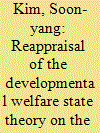

|
|
|
|
|
| Summary/Abstract |
The purpose of this article is to re-examine the perspective on the relationship between East Asia’s growth economy and its underdevelopment of state welfare, by analyzing the Korean case between the 1960s and the 1980s, when active governmental intervention in the economy led to rapid economic growth. This article aims to answer the questions ‘Was state welfare genuinely underdeveloped under the growth economy of East Asia?’ and ‘If so, which factors hindered its development?’ To this end, this article first refutes the perspective regarding the underdevelopment of state welfare in East Asian growth economies, through an empirical analysis of the following: overlooking diverse indices in measuring the level of state welfare, a comparison without considering different budget systems, negligence of output aspects, giving undue value to quantitative methods and paying little attention to welfare beneficiary aspect. The article traces the reasons why the growth economy experienced the underdevelopment of state welfare using comprehensive frameworks: large-scale resource distribution to defense and education, low level of electoral competition, underdevelopment of socialist political parties, political authoritarianism and weak opposition, lack of social citizenship and preservation of family values, underdevelopment of trade unionism, and inactivation of civil society.
|
|
|
|
|
|
|
|
|
|
|
|
|
|
|
|
| 8 |
ID:
172350


|
|
|
|
|
| Summary/Abstract |
Though resettlement and rehabilitation is considered to offer a development opportunity for project-displaced people, such people are often not cared for and continue to be disregarded by the powerful governments in India in their ‘development’ projects. Oustees in India continue to be one of the most deprived sections of society, and resettlement and rehabilitation is still a critical issue of concern to them. Their basic rights to a decent life are violated in the resettlement and rehabilitation process, although the Indian Constitution guarantees certain rights to its citizens. Such deprivation and violations of rights in resettlement and rehabilitation can be seen particularly in the case of the Gundlakamma Reservoir Project in the State of (undivided and residual) Andhra Pradesh.
|
|
|
|
|
|
|
|
|
|
|
|
|
|
|
|
| 9 |
ID:
172347


|
|
|
|
|
| Summary/Abstract |
A dominant conception of poverty among many researchers is that it is a form of deprivation. There is, however, more focus on the idea of poverty as physical deprivation than there is on psychological deprivation. I argue that poverty is as much a psychological deprivation as it is a physical deprivation and propose a new index that explicitly takes the psychological into account in poverty measurement. I show that most extant literature tends to focus more on physical deprivations which poverty causes. I discuss some poverty indices which are employed to measure levels of poverty and highlight their inadequacy. Employing the conversational method, I tap into Odera Oruka’s ideas to offer the Human Minimum Measure (HMM) as a model that might also be desirable if the reality of psychological deprivation is taken seriously.
|
|
|
|
|
|
|
|
|
|
|
|
|
|
|
|
|
|
|
|
|